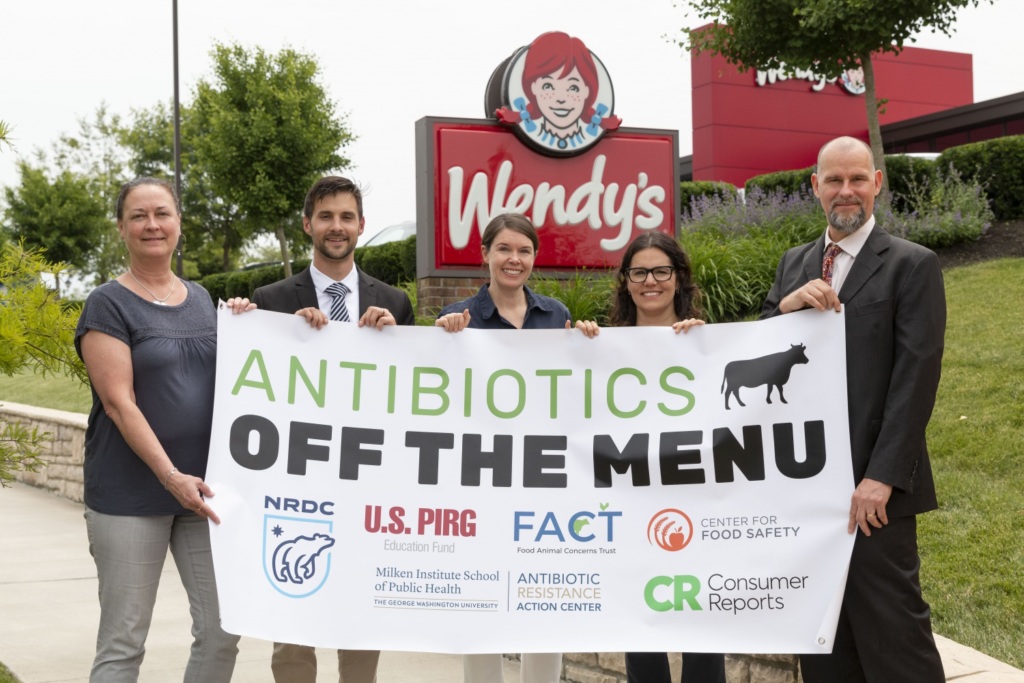
Matt Wellington
Former Director, Public Health Campaigns, U.S. PIRG Education Fund
Wendy's, the third largest burger chain in the country, committed to prohibiting the routine use of medically important antibotics in its meat supply chains by the end of 2030.
Former Director, Public Health Campaigns, U.S. PIRG Education Fund


Despite the dangers of overusing medically important antibiotics, two-thirds of them sold in the United States don’t go to people. Instead, they’re given to livestock that often aren’t even sick. Meat producers use the drugs routinely to prevent disease brought on by unsanitary, overcrowded and stressful living conditions. These farms can be incubators for antibiotic-resistant bacteria, which can then hitch a ride off the farm in infected workers, contaminated meat or polluted water. Once out in the great big world, these superbugs can infect anyone — even someone you love.
Three weeks ago, my cousin lay in a hospital bed battling an antibiotic-resistant infection. Thankfully, he survived, but many people don’t. We don’t know how he got his infection, and that’s part of the danger. Any time antibiotics are used, you roll the dice that you’ll breed antibiotic-resistant bacteria that can circulate among people and the environment, waiting to pounce. These superbugs kill at least 35,000 people a year in the United States, with some estimates putting the death toll as high as 162,000. Health experts agree that without swift action to stop antibiotic overuse, we could soon be living in a world where these life-saving medicines no longer work.
That’s why since 2015, U.S. PIRG and the Antibiotics Off the Menu coalition have been urging major fast food companies to commit to only purchasing meat raised without overusing antibiotics.

In its recent 2020 corporate responsibility report, Wendy’s committed to phasing out the routine use of medically important antibiotics in its beef, chicken and pork supply chains in the United States and Canada by the end of 2030. Wendy’s, the third largest burger chain in the country, is one of the few leading restaurants to make such a commitment across all three of the primary meat categories.
Wendy’s action is the latest by a specific restaurant, but the goal of our campaigns is to shift the marketplace as a whole. Over the past six years, the majority of top fast food companies have started serving chicken raised without medically important antibiotics; pressure from those leading restaurants helped shift the chicken industry as a whole away from overusing the drugs.
The bad news is that far fewer companies have taken action to reduce antibiotic use in their beef and pork supplies. And those meat sectors drove an overall increase in the sales of medically important antibiotics to the meat industry in 2019, even as use in chicken continued to decrease.
That’s why in recent years U.S. PIRG and the coalition shifted focus to urging major beef buyers to use their purchasing power to spark change in the beef industry. McDonald’s was the first company to take a stance, committing in 2018 to monitor and set targets for reducing the use of medically important antibiotics in much of its global beef supply chain. Unfortunately, the company failed to meet its own 2020 deadline for setting those targets.

Since 2019, we have mobilized consumer support across the country to encourage Wendy’s to take significant action on beef. Its commitment to a deadline for purchasing only beef raised without routine use of medically important antibiotics should help break the logjam in the beef industry. As more major buyers signal to their suppliers that their consumers want them to go in this direction, it will build up enough purchasing power to force change.
We appreciate Wendy’s major step forward, and we hope the company adopts a faster pace for its proposed timeline and follows through with its goal. Kudos to the company for taking action on pork as well.
Former Director, Public Health Campaigns, U.S. PIRG Education Fund